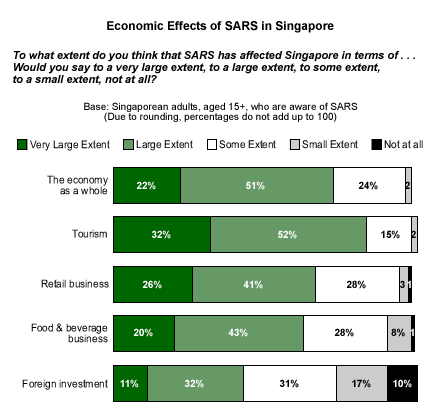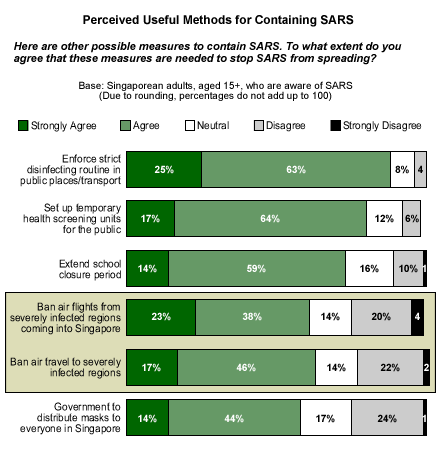The severe acute respiratory syndrome (SARS) crisis, the effects of which are being felt across East Asia and many countries around the world, comes on the heels of dampened growth from the worldwide economic slowdown. The negative economic effects resulting from the fear of the spread of SARS are clearly being felt in Singapore. Last week, Singaporean Prime Minister Goh Chok Tong indicated that economic growth in Singapore will be trimmed by one-half to one percentage point. This follows first quarter gross domestic product growth of 1.5% in Singapore year-on-year, which was half of what was expected.
Results from a recent Gallup Poll in Singapore* further confirm that SARS is harming the Singaporean economy. Ninety-eight percent of Singaporeans feel that SARS has affected the economy of Singapore as a whole at least to some extent, with nearly a quarter (22%) saying they believe the economy has been affected to a very large extent.
Tourism is big business in Singapore, representing some 5% of the gross domestic product, with total annual visitor spending at about $4.5 billion (U.S.). Preliminary data from the Singapore Tourism Board suggest a 15% reduction in tourist arrivals for March, when compared with the previous period. Hotels and restaurants are indicating occupancy rates in the range of 20% per night. There is no question that tourism has been one of the hardest-hit sectors of the Singaporean economy -- one in three (32%) Singaporeans believe that SARS has affected tourism to a very large extent, and 52% believe it has been affected to a large extent.
Gallup also asked Singaporeans their opinions on how SARS has affected several other sectors of the economy. About two-thirds (67%) of Singaporeans feel that retail business has been affected either to a very large extent (26%) or a large extent (41%). Sixty-three percent think that the food and beverage business has been affected to a very large (20%) or large (43%) extent, and 43% feel foreign investment has been affected to a very large (11%) or large (32%) extent.

The Malaysian government took an unprecedented step this past week by imposing a temporary ban on all mainland Chinese and Hong Kong visitors and placing restrictions on travelers from Canada, Taiwan, and Vietnam. As discussed in last week's article (see "Three in Four Singaporeans Worried About SARS" in Related Items), majorities of Singaporeans agree that bans on air travel to and from various locations are needed to help stop SARS from spreading.

Even though most Singaporeans feel that flight restrictions are necessary, there is no question that the drop in air travel due to fear of SARS is already having devastating effects on the airline industry not just in Asia, but globally. The International Air Transport Association warned that SARS could hurt the airline industry more than the war in Iraq. Airlines around the world have slashed flights, while some, including Qantas, have announced job cuts.
Many foresee that the worst is yet to come. Second quarter economic numbers are undoubtedly going to be worse and the third quarter may feel the brunt of SARS as well. Unfortunately, this economic contraction may spell signs of the second recession for Singapore in a period of two years.
*The Gallup Poll on SARS in Singapore was conducted on April 2-3, 2003, among a random sample of 512 Singaporean citizens and permanent residents, aged 15 years and older. The maximum sampling error for this study is ±4.3% at a 95% confidence level. This means if the study was to be replicated with a random sample of 512 respondents 100 different times, 95 out of 100 times the poll results will be within a range of +4.3%. Interviewing was conducted face-to-face.